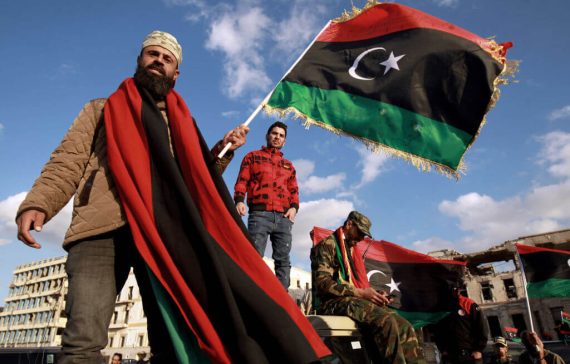President Biden’s agenda will have to focus overwhelmingly on U.S. domestic politics given the pressing challenges surrounding COVID-19 and the economic fallout from this unprecedented public health crisis. His administration has underlined their commitment to a foreign policy that better reflects the concerns and priorities of America’s middle class.
There is much debate about what this “foreign policy for the middle class” will look like, but you can be sure that the administration will be focusing on ending the “forever wars” and attempting to more substantively pivot away from the Middle East toward Asia and competition with China, a goal that proved elusive during previous administrations.
The Biden administration is not seeking to end U.S. engagement in the Middle East, but rather to limit the U.S. military presence in the region and to engage in greater multilateral diplomacy. The U.S.-led regional security architecture that has been in place for decades is no longer sustainable, and the new administration is eager to cultivate partnerships to increase burden sharing and encourage regional stability, while also assuring that its own strategic interests are still protected.
Biden’s Foreign Policy Priorities
The Biden administration is working on reinvigorating America’s State Department, which suffered from an unprecedented level of resignations and long-term vacancies during the Trump administration, and on cultivating greater multilateral cooperation with allies that were often disregarded over the last four years.
Biden officials speak much more of human rights and democratic norms, in stark contrast to Trump, but it’s unclear how much of this will lead to a substantive realignment of policy priorities in the Middle East. Sanctions over human rights violations are already being implemented, but they rarely target the major violators in conflicts and human rights violations, especially not heads of state.
The conflict in Libya will constitute a significant policy priority in the Transatlantic relationship between the United States and Europe.
Regarding Middle East priorities, Biden officials have laid out very clear priorities, namely returning to the Iran Nuclear Deal and supporting conflict resolution efforts in Yemen, both of which Biden’s teams are working vigorously to advance. This translates to a significant strategic focus on regional security in the Gulf and on Iranian influence in conflict theaters like Iraq, Syria, and Lebanon.
North Africa will not feature high on the list of priorities. However, the conflict in Libya will constitute a significant policy priority in the Transatlantic relationship between the United States and Europe.

VIDEO: Russian Expansionism under Vladimir Putin
U.S. Policy in Libya
The Biden administration’s foreign policy in Libya is focused on counterterrorism and Russia’s growing role there via the presence of mercenaries like the Wagner Group, as well as supporting the new Government of National Unity (GNU) and their mission to hold free and fair elections in December 2021. In July 2020, U.S diplomats unequivocally expressed “opposition to all foreign interference.”
The Biden administration echoes this position and is seeking to partake in multilateral diplomacy aimed at supporting a key stipulation of the October 2020 ceasefire agreement, namely the withdraw of all foreign forces from Libyan territory, and to provide financial support for security, stabilization, and humanitarian assistance. The United States will also be providing operational support for Libya’s High National Elections Commission in preparation for elections this year.
The United States maintains important bilateral relations with foreign patrons on both sides of the Libyan divide, namely Turkey, UAE, Egypt, France, and Russia, and is working to apply pressure on these actors to withdraw from Libya’s conflict by pushing all parties to respect the UN arms embargo, which the UN Panel of Experts recently argued was “totally ineffective.”
Libya offers a crucial milieu where the Biden administration can put its commitment toward multilateralism and diplomacy into action.
Former acting UN envoy on Libya and veteran American diplomat Stephanie Williams stated that an estimated 20,000 foreign fighters were present in Libya. Some reports indicate that some countries which have mercenaries in Libya are now planning to withdraw them in line with the current reconciliation process.
Libya offers a crucial milieu where the Biden administration can put its commitment toward multilateralism and diplomacy into action. This conflict also represents an opportunity to reinvigorate the Transatlantic partnership, which was damaged during the Trump administration.
Biden has emphasized time and time again that the United States needs to repair its ties with key European allies, and supporting conflict resolution efforts in Libya is a key modality through which to pursue this policy goal. Libya is at the top of the agenda in talks between the United States and European allies like Germany and France.
The Libyan conflict is in many ways more pressing for America’s European allies, who are preoccupied by concerns of regional instability, counterterrorism, migration, and Russian presence at NATO’s backdoor. The internationalized nature of the Libyan war is also linked with other regional tensions along Europe’s southern border, namely the tensions between Turkey, Greece, and other European and Middle East powers over maritime rights and resources in the Eastern Mediterranean.
Recommended
Beyond supporting the tenuous ceasefire and political transition in Libya, the Biden administration can offer more humanitarian support and coordination for the estimated 574,000 foreign migrants, 316,000 internally displaced persons, and 44,000 refugees in Libya. The outbreak of COVID19, on top of the political instability and violence, hurts these vulnerable communities especially hard. It will take a long-term commitment from the international community to help rebuild Libya’s fragmented and under-resourced institutions, not to mention to ensure that the ceasefire holds.
Libyan experts have laid out a host of economic, political, and security challenges facing the Government of National Unity. Already the optimism surrounding the parliament’s approval of this interim government has been tamed by several high-profile political assassinations in both Benghazi and Tripoli, yet another indication of the urgent need for security sector reform.
Conflict Resolution Across the Region
Moving forward the Biden administration needs to maintain its active diplomatic efforts in Libya and work as closely as possible with its European allies on supporting the ceasefire and the political transition, as well as on pressuring foreign actors to withdraw from the conflict. This will be a difficult feat. The U.S. administration should take this a step further by helping to push the Libya Stabilization Act through Congress.
This will help harmonize and bolster U.S policy on Libya, as well as ensure better funding and tools to support the deteriorating humanitarian situation and to punish actors contributing to the violence in Libya. At present, Biden’s team of foreign policy veterans have demonstrated a commitment to conflict resolution efforts across the Middle East and North Africa, even if they have to prioritize certain countries and regions over others, reflecting their understanding of the interconnected nature of conflict and tensions across the region.
But U.S. influence is limited, and as the global order is shifting from a unipolar to multipolar alignment. Great power competition between the United States, China, and Russia, as well as a host regional tensions between middle powers like Iran, Israel, Turkey, and Gulf states, will test the strength of international institutions and multilateralism moving forward, a reality that does may not bode well for international cooperation and conflict resolution in the future.





